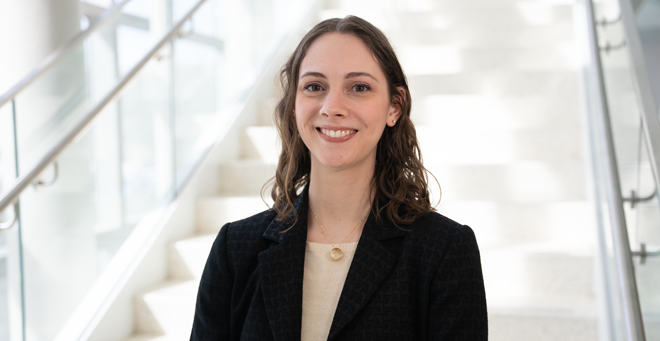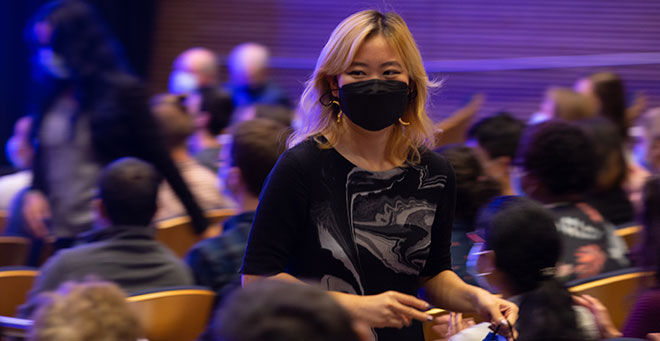
Carolyn Kraus, a PhD candidate in the Morningside Graduate School of Biomedical Sciences Interdisciplinary Graduate Program, has received a Ruth L. Kirschstein National Research Service Award Individual Predoctoral Fellowship from the National Institute of Arthritis and Musculoskeletal and Skin Diseases to study how CRISPR/Cas9 tools can be used to develop a therapeutic for Duchenne muscular dystrophy.
Duchenne muscular dystrophy is a degenerative disease with no cure. An estimated 20,000 children worldwide are diagnosed each year. CRISPR, short for “clustered regularly interspaced short palindromic repeats,” is a technology that scientists use to selectively modify the DNA of living organisms.
“Cas9 is an enzyme that can find certain sequences in your DNA and cut it to make changes, which is really powerful,” Kraus explained. “One of the problems with Cas9 is that sometimes it ends up in tissues where we don’t necessarily want it to be hanging out and changing things, which of course, is a big safety concern. So, my project is figuring out how to get Cas9 to only edit in specific tissues.”
Kraus’s mentor is Erik Sontheimer, PhD, the Pillar Chair in Biomedical Research and professor of RNA therapeutics. The Sontheimer lab has been able to successfully edit the liver of animals without impacting other tissues.
“I was able to squish the editing components into a single virus instead of the two viruses used in our initial liver study. Now we have hopefully better efficiency, you can use lower doses, which will decrease hepatotoxicity—liver damage—and decrease manufacturing burden and cost—all of which are good things,” Kraus said.
With her NIH-funded research, Kraus is employing a strategy that might be broadly applicable to Duchenne muscular dystrophy patients. Dystrophin, the gene that causes Duchenne muscular dystrophy, is the largest gene in the human genome. Kraus says Dystrophin’s size presents challenges, but also opportunities.
“This big gene is made up of exon chunks. And sometimes those can get out of frame. If you shift that reading frame, you’ve changed the entire protein. But sometimes we can get rid of an exon or skip it. And you’ve restored the reading frame and have a maybe slightly shorter but very functional protein in the end,” Kraus said.
“Carolyn’s approach to controlling genome editing tissue specificity is exciting, and she wrote an outstanding proposal to develop it in the context of DMD,” Dr. Sontheimer said. “Just as importantly, her work will set the stage for similar strategies for other genome editing applications beyond muscle.”
Kraus grew up in Dedham. After earning a biology degree from Emmanuel College, she worked at MassBiologics of UMass Chan Medical School as a research and development associate. Through the UMass Chan PhD program in biomedical sciences, Kraus was able to rotate through multiple labs before deciding to focus on CRISPR.
“Doing something that could help a patient population with an unmet need, like Duchenne muscular dystrophy, is a really satisfying thing to tackle,” Kraus said.
